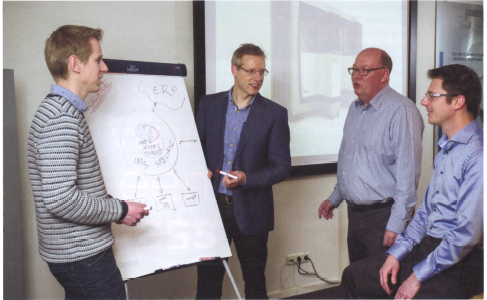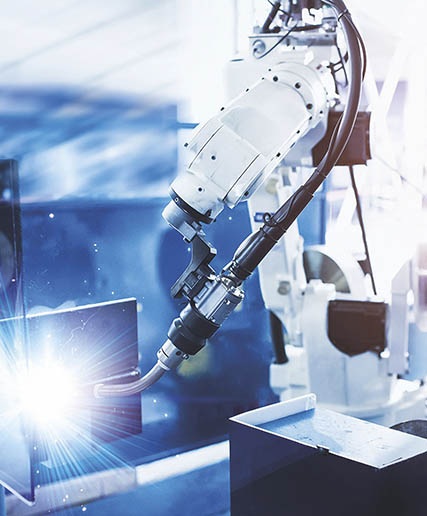Open application



Simplification is a job in itself
‘Flexibility’ and ‘scalability’ are buzzwords in modern production systems in Industry 4.0. However, following a recent takeover, the engineering company VIRO now has the software and control skills to develop a toolkit for the related system architecture. Machine manufacturer IMS has been using the toolkit to equip its latest generation of flexible and scalable production systems with the intelligent controls they require.

Speaking about the flexible system architecture developed by VIRO for launching customer IMS: from left to right: Barry te Dorsthorst (IMS), Theo de Vries (VIRO), Ton Pothoven (IMS/WWINN), and Jacob Vlasma (VIRO): Photo: Arjan Reef
Headquartered in Hengelo (Overijssel, the Netherlands) and with 600 employees, VIRO is a growing international engineering company specializing in engineering and project management. Clients with engineering and industrial projects ask VIRO for support and added value across the chain, from the first idea and engineering to production and commissioning a machine. There are numerous ways to provide this service, such as by improving quality, accelerating turnaround times, reducing costs, encouraging further flexibility, and delivering expert knowledge, thinks Jacob Vlasma, director of the Hengelo HQ. Given this potential, VIRO was eager to expand its range of services. VIRO’s most recent acquisition was its Software & Control department, which the company acquired through last year’s takeover that saw nine employees from Enschede-based Imotec join the VIRO team. Managed by Theo de Vries, this department is developing technology and high-end control software for machines and other mechatronic systems. They aim to support VIRO’s customers in Industry 4.0 with advanced software, systems engineering, and smart ideas for system architecture.
Unpredictable
One of these customers is the Almelo-based IMS, part of the WWINN Group that employs 90 workers. IMS develops and builds production systems for the semi-automated and highly-automated production of mostly small composite products. These can be used as components for consumer electronics, such as smartphones, as well as for medical devices. ‘We have been in business since 1999,’ says Ton Pothoven, General Manager of WWINN. ‘We started off by providing customization and dedicated systems for a specific product. We then began to focus on modular systems that offered the flexibility to manufacture various products within a product family. Now we see a demand for flexible, scalable production platforms, especially from companies wanting to keep production in Europe close to their innovation centres. They are eager to optimize wage costs and quality. They want to start automating early on in the lifecycle, provided that a product design hasn’t been set in stone and the production numbers aren’t too large. However, these companies also want to avoid the risk of investing a large sum of money in a dedicated machine to manufacture a product with a life cycle that is still hard to predict. This is why we are now developing a platform that is flexible and reconfigurable, just like existing machines, but which is also more scalable and programmable. One single machine must be able to process production flows for a huge range of products. A generic platform like this would enable customers to easily adapt to changes in their market.’
Intelligent control
The new concept by IMS, called METIS 4.0, offers an impressive degree of flexibility. However, according to Pothoven, this calls for an equally large variety of intelligent control functions, so that the system can be used to its full potential. ‘Our expertise is concentrated in the real-time world, the world that involves motion control and a succession of manufacturing steps on a machine. Flexible control of whole production cells and lines is relatively unknown territory for us, so we joined forces with VIRO to take this technology to a higher level. Although VIRO already provides us with a lot of support in terms of mechanical engineering. Having Theo and his expert team available gave us the opportunity to get the ball rolling. They are developing a toolkit tailored to our specific requirement: to have intelligent control that not only has an interface that is compatible with our low-grade machine controls, but can also integrate third-party components and provide interfacing for other areas, from ERP [highest-level production planning, eds.] to maintenance systems. This is the flexibility we see in Industry 4.0.’
Reuse
Theo de Vries explains VIRO’s concept. ‘The basic design of the system architecture ensures that any changes to accommodate specific automation solutions are easy to make. We first develop the basic functions and then demonstrate that it works effectively and reliably.’ Pothoven adds, ‘This means you – the controller – do the same as us on the physical front: creating an architecture with modules that you can reuse to quickly and, most importantly, predictably generate a customer-specific solutions in a cost-effective way.’ IMS acts as a launching customer for the toolkit being developed by VIRO. However, VIRO also wants to attract customers from other market segments, adds De Vries. ‘Our toolkit needs to be generic in nature, so we must make sure it can be used by users outside the target group. To achieve this, an IP [intellectual property, eds.] philosophy has been integrated into the software architecture, out of respect for IMS’s commercial interests. The toolkit contains no components that would distinguish their competitive position. The challenge we face is to establish the right degree of flexibility and scalability.’ This is why collaboration is so important, says Barry te Dorsthorst, electrical engineer at IMS. ‘We have specific ideas about flexibility, but you ensure that the toolkit contains other ideas that may be slightly removed from our market.’ Pothoven believes flexibility is IMS’s biggest challenge. ‘Our systems need to be able to process lots of different forms of products. Our aim is to minimize the need for specific engineering, as this is time-consuming and risky. The best scenario would be one with a flexible solution that looks relatively simple.’ Theo de Vries agrees. ‘I believe simplification is a job in itself. That, however, is what makes it so interesting.’ VIRO’s vision is centred on the openness of the system architecture, so that customers have the freedom to expand the control mechanisms. Te Dorsthorst continues, ‘The transition from our real-time control to a higher control layer will result in a very open interface based on communications standards.’ De Vries says, ‘We need to provide an interface for lots of systems; but our abilities remain limited, so we need to make choices. However, speaking to a range of users and applying the toolkit directly in a variety of projects helps to inform the decisions we make.’
Leading position
According to Jacob Vlasma, VIRO doesn’t plan to market the toolkit as a software product. ‘We will use the toolkit to perform projects for customers cost-effectively, with short lead times and with guaranteed quality. We want to use the toolkit to improve the chain’s competitiveness (our customer and us as their service provider).’ The development of the toolkit is an ongoing process, but IMS will immediately use any completed components in the new systems. Pothoven adds, ‘We will have a fully demonstrable system in a couple of years. We’re pretty sure that we’re the first to launch this type of product. Most of our competitors still supply dedicated systems, but we’ve noticed that some of them are now marketing modular solutions. METIS 4.0 should help us regain our leading position. And from the extraordinary amount of feedback from customers, we’ve reason to believe that. Although our system is an excellent tool for high-volume production in Asia, our primary objective is to create flexibility that our customers in Europe are looking for. Our platform and VIRO’s toolkit enables them to make a generic investment that they can earn on a return on with any number of products, not just a specific product.’
link Special Oost-Nederland – february 2016